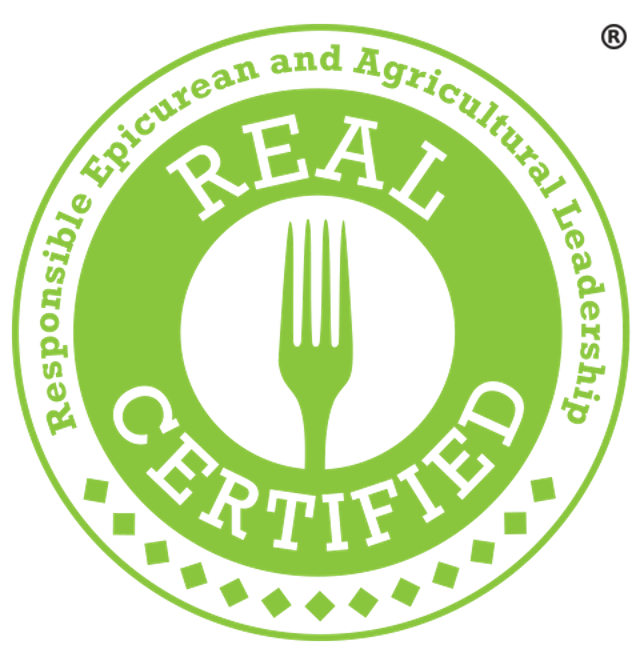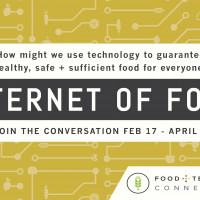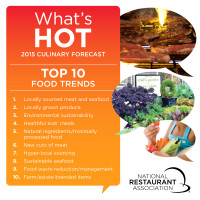
In tandem with the launch of the Food+Tech Job Board, we are thrilled to launch the Food Startup Growth Series. This series will give you an inside look at the strategies, challenges and best practices of fast-growing food startups and organizations.
Many foodservice operators are benefiting from the halo effect of sustainability, but it’s hard to tell how truthful their sustainability claims really are. Similar to what LEED certification did for the building industry, United States Healthful Food Council (USHFC) is bringing transparency and guidance to the food industry by creating market-based incentives, programs and tools to increase the profitability of healthy, sustainable food.
The non-profit offers three programs: recipe analysis and menu labeling, nutrition consulting services and a certification program. Through its Responsible Epicurean and Agricultural Leadership Certification Program (REAL), it partners with third party registered dietitians to certify that operators’ menus, operations and supply chains are healthful and sustainable. For operators, REAL Certification offers a great marketing tool, as well as access to products from a network of certified ingredients suppliers at a discount. To date, there are 500 foodservice operations have received REAL Certification, including Restaurant Nora, Chipotle’s Shophouse, Bare Burger, Google, Stanford University and Boulder Valley School District.
USHFC is the brainchild of Lawrence Williams, an entrepreneur with a long history of tackling big challenges. Prior to USHFC, he worked with Elon Must to develop a collaboration between SpaceX and NASA to develop a domestic commercial crew and cargo for space travel. He also worked with Craig McCaw and Bill Gates’ Teledesic to negotiate with the FCC to make broadband access ubiquitous through the use of low-Earth orbiting satellites.
Lawrence’s experience in the tech world has always informed how he operates USHFC. Creating a new market and a new certification is no easy feat, but will perseverance USHFC has gotten some of the most reputable brands on board. Now, like any good entrepreneur, Lawrence realizes that its going to take a different skill set to scale the organization, so he is bringing on a new CEO.
I spoke with Lawrence about the biggest challenges he’s faced in scaling, how he’s treated his non-profit more like a startup and how new leadership will impact the direction of EatReal.
__________________
Danielle Gould: What’s keeping your team busy right now?
Lawrence Williams: We are currently in the process of finalizing and rolling out our updated certification standards, which we’re calling REAL 3.0. For the first time, this new certification will include numerous levels of certification (REAL, Silver, Gold and Platinum), which will allow for a deeper dive on some of the more complicated issues. We are also hosting the Eat REAL Roundtable and Eat REAL Kitchen Sausalito next week, where we will gather industry and NGO leaders for a two-day working group to weigh in and finalize the standards.
DG: What are your growth goals for the next 12-24 months, and how do you plan to achieve those goals?
LW: This is an exciting time for EatREAL! We just completed a merger with another nonprofit (The Institute for Responsible Nutrition), and are working through incorporating their board and leadership team into our organization, as well as the creation of a scientific advisory board to inform our standards. We are also in the final stages of hiring on a new CEO, who will be able to step in and scale our certification program to meet our growing demands. In the next year or two, we are going to work on expanding our consumer-facing brand and expand our footprint with the REAL 3.0.
DG: What does your team look like?
LW: We are a small and self-motivated team distributed between Washington, DC, Nashville, Chicago and San Francisco, supported by a nationwide network of registered dietitians. With fewer than ten people running a nationwide certification program, everyone here wears many hats.
DG: What does your company culture look like? How have you built your company culture?
LW: We have tried hard to act and operate more like a scrappy startup than a typical not-for-profit organization. Even though we are a non-profit, we try to function as a mission-driven business, not a charity.
DG: How are you preserving your company culture as you scale up?
LW: We spend a lot of time making sure we bring in the right cultural fit and we have weekly all-team meetings.
DG: What do you know now that you wish you would have known when you started scaling your company? What are the biggest challenges and lessons learned as you’ve grown your company?
LW: Externally, the biggest challenge in scaling has been working with the foodservice industry, which can be challenging because generally speaking the hours are very long and margins quite small.
DG: What will someone who works for you be able to add to their resume?
LW: Working with EatREAL to help transform our food system provides an opportunity to make a make a huge difference on what is probably the issue of our time. Food is integrally linked to the health of all people and the planet.
DG: What job(s) are you hiring for, and how will those positions help drive growth in your company?
LW: We are currently hiring a new CEO, which, as you might imagine, is quite pivotal for the development of the organization. This new leadership will determine the direction of EatREAL in the coming years – for a non-profit at this stage in its lifecycle, the input of our new CEO has the clout to fundamentally influence our brand recognition within the marketplace and to consumers.
DG: What kind of training do you offer for new employees who may be switching from other industries or who are just out of school?
LW: Working for EatREAL offers an opportunity to dive into the flow of an active and expanding organization while still being supported by your teammates. Here, a new hire or a new graduate will be able to explore a variety of avenues within the nonprofit world in order to discover which of their areas of interest are the most applicable and enjoyable in practice.
DG: What’s your favorite interview question?
LW: What motivates you to want to join our team?
DG: Why do you think it’s exciting to be working in food right now?
LW: There is no denying that food is a hot-button issue across the board right now. It is a dynamic time to be involved in the industry as we are confronted daily with new developments, policies, science, and research. What’s more is that food culture is inextricably linked to a variety of different issues and industries – whether on the side of social dialogue around such topics as race, socioeconomic status, and disease, or around industries such as distribution, education, and technology. As such a central component to our daily lives, food serves as an intellectual and ideological hub for people from many backgrounds and industries to converge and exchange ideas and information.
Check out exciting food tech, design, management, operations, development and food science positions at Food+Tech Jobs.





